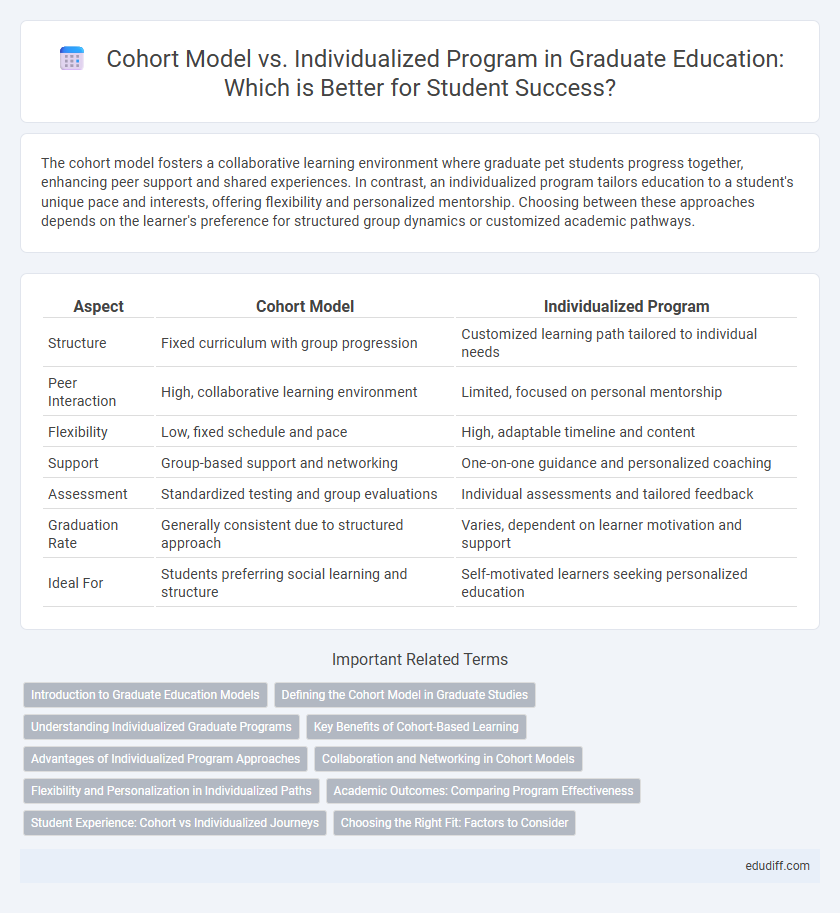The cohort model fosters a collaborative learning environment where graduate pet students progress together, enhancing peer support and shared experiences. In contrast, an individualized program tailors education to a student's unique pace and interests, offering flexibility and personalized mentorship. Choosing between these approaches depends on the learner's preference for structured group dynamics or customized academic pathways.
Table of Comparison
| Aspect | Cohort Model | Individualized Program |
|---|---|---|
| Structure | Fixed curriculum with group progression | Customized learning path tailored to individual needs |
| Peer Interaction | High, collaborative learning environment | Limited, focused on personal mentorship |
| Flexibility | Low, fixed schedule and pace | High, adaptable timeline and content |
| Support | Group-based support and networking | One-on-one guidance and personalized coaching |
| Assessment | Standardized testing and group evaluations | Individual assessments and tailored feedback |
| Graduation Rate | Generally consistent due to structured approach | Varies, dependent on learner motivation and support |
| Ideal For | Students preferring social learning and structure | Self-motivated learners seeking personalized education |
Introduction to Graduate Education Models
Graduate education models include the Cohort Model, where students progress through a program as a unified group, fostering collaboration, shared experiences, and structured pacing. In contrast, the Individualized Program offers personalized learning paths tailored to each student's unique goals, allowing flexibility in course selection and pacing. Understanding these models helps graduates select the approach that best supports their academic and professional development.
Defining the Cohort Model in Graduate Studies
The Cohort Model in graduate studies organizes students into a fixed group that progresses through the curriculum together, fostering collaboration and peer support. This structure enhances learning outcomes by encouraging consistent interaction, shared experiences, and collective problem-solving. Unlike individualized programs, the cohort model emphasizes group cohesion and synchronized progression through defined academic milestones.
Understanding Individualized Graduate Programs
Individualized graduate programs offer tailored coursework and research opportunities that align closely with a student's specific academic and professional goals, providing flexibility that cohort models typically lack. These programs prioritize personalized mentorship and adaptable timelines, enabling students to engage deeply with interdisciplinary subjects and unique career paths. Understanding individualized graduate programs is essential for students seeking a customized educational experience that accommodates their distinct strengths and aspirations.
Key Benefits of Cohort-Based Learning
Cohort-based learning fosters collaboration and networking among graduate students, enhancing peer support and collective problem-solving. This model encourages accountability and motivation through shared goals and deadlines, leading to higher course completion rates. Students benefit from diverse perspectives within their cohort, enriching their academic experience and professional development.
Advantages of Individualized Program Approaches
Individualized program approaches in graduate education offer tailored learning experiences that address specific student needs, promoting higher engagement and deeper understanding. Customized curricula accommodate diverse academic backgrounds and career goals, enhancing flexibility and fostering skills directly relevant to professional development. This personalized structure supports self-paced progress and continuous feedback, improving retention and academic performance.
Collaboration and Networking in Cohort Models
Cohort models foster strong collaboration and networking by grouping graduate students with shared academic goals, facilitating peer-to-peer learning and collective problem-solving. This structured environment enables the development of lasting professional connections and access to diverse perspectives, enhancing career opportunities. Individualized programs often lack this built-in social dynamic, making cohort models particularly advantageous for students seeking immersive community engagement and collaborative growth.
Flexibility and Personalization in Individualized Paths
Individualized programs offer superior flexibility by allowing graduate students to tailor their coursework, research focus, and learning pace according to personal goals and professional demands. Unlike cohort models, which follow a fixed curriculum and schedule designed for group progression, individualized paths enable greater personalization in skill development and interdisciplinary exploration. This adaptability supports diverse career trajectories and fosters deeper engagement through customized academic experiences.
Academic Outcomes: Comparing Program Effectiveness
The Cohort Model fosters collaborative learning and peer support, often leading to higher retention rates and consistent academic performance among graduates. Individualized Programs tailor curricula to student needs, enhancing engagement and skill mastery, which can improve personalized academic outcomes. Comparative studies indicate that while Cohort Models excel in promoting social learning and timely completion, Individualized Programs better accommodate diverse learning styles and career goals, impacting overall program effectiveness.
Student Experience: Cohort vs Individualized Journeys
Graduate students in a cohort model benefit from structured peer support and collaborative learning, fostering a sense of community and shared goals. In contrast, individualized programs offer personalized pacing and tailored academic paths, allowing students to focus deeply on their unique interests and career objectives. The choice between cohort and individualized journeys significantly impacts student engagement, motivation, and overall graduate experience.
Choosing the Right Fit: Factors to Consider
Selecting the right graduate learning approach depends on individual goals, learning styles, and career objectives, with the Cohort Model fostering collaboration, peer support, and structured timelines, while the Individualized Program offers flexibility, personalized pacing, and tailored content. Consider program accreditation, faculty expertise, resource availability, and support services to ensure alignment with professional aspirations and academic needs. Evaluating outcomes such as graduation rates, employment statistics, and alumni networks provides critical insight into the effectiveness of each model for career advancement.
Cohort Model vs Individualized Program Infographic

 edudiff.com
edudiff.com